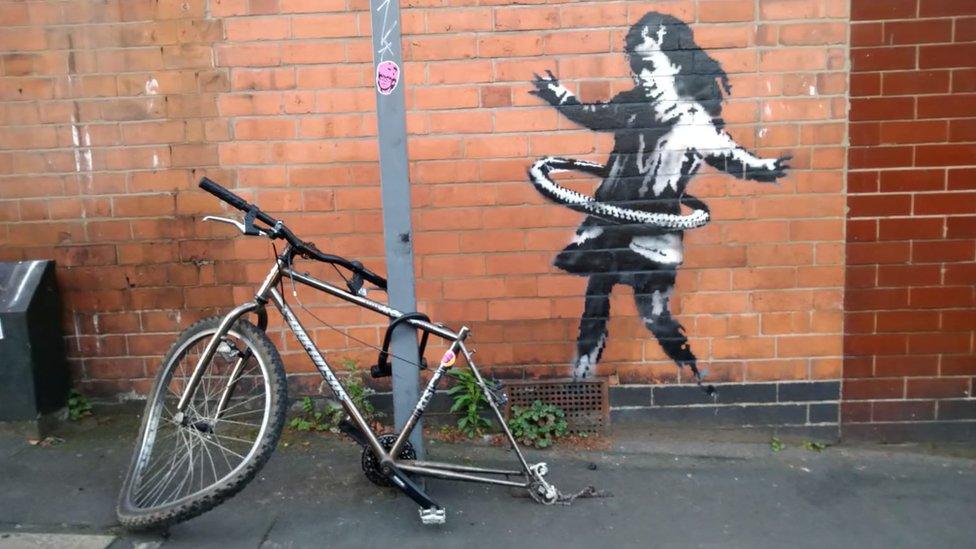'Banksy art was for the people of Nottingham'
- Published
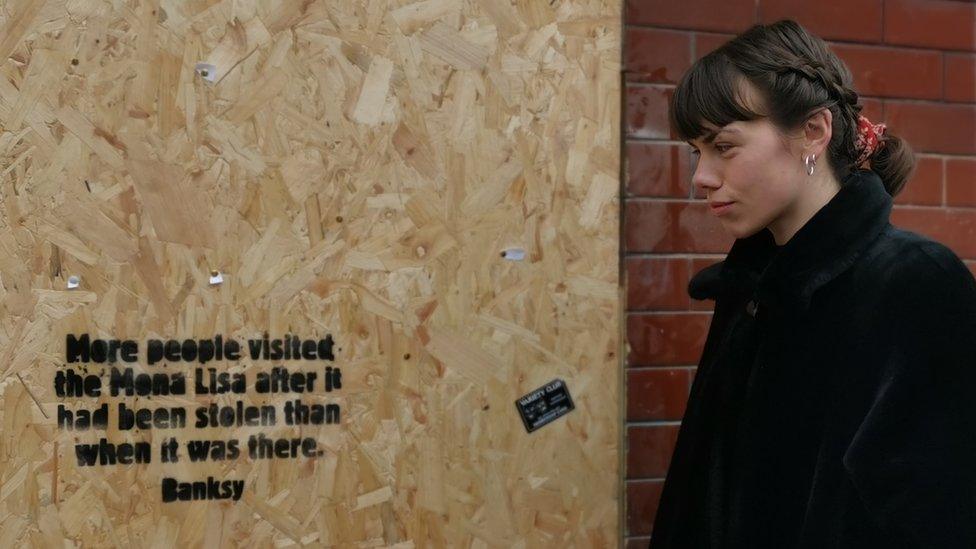
A message has been stencilled on the board covering the dismantled section of wall
When a Banksy mural appeared on the side of a beauty salon in Nottingham, it was an uplifting moment.
At the time, the city was struggling with one of the highest Covid infection rates in the UK, and - as one resident put it - "we needed something like this".
It is no surprise then that the sudden removal of the "hula-hooping girl" has not gone down well.
The piece was cut from the side of the salon in the early hours of Wednesday, having been sold to a Essex-based art collector.
Gallery owner John Brandler, who paid a six-figure sum for the Banksy, said he acted in order to help preserve it.
He also said there had been "nothing to stop any of the businesses in Nottingham buying it".
But while many locally have acknowledged the building owner's right to sell the artwork, most argue the area has lost something special.
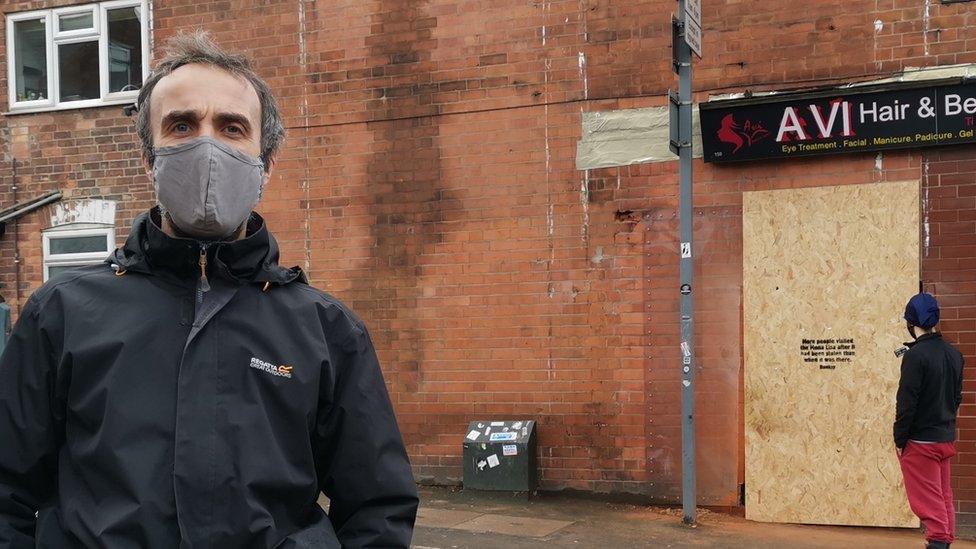
Ian Clayton said the mural was "something Nottingham could be proud of"
Ian Clayton, 45, an engineer from Wollaton, said he was disappointed something "unique" had been taken away.
"I thought it was a bit of a bright spot in lockdown, it was something Nottingham could be proud of," he said.
"I don't think anyone comes out of it well - the guy that bought it, the people that sold it, the council that do not seem to have realised what they had."
'Meant a lot'
Laura Rodgers, 63, from Hyson Green, went further. She said: "It's absolutely disgusting - this art was for the people of Nottingham.
"It's not meant for an art gallery, it's meant for the street. It should have stayed here.
"It's like capitalism in tooth and claw.
"It was some recognition of an area that is poor, underprivileged. It meant a lot to people."
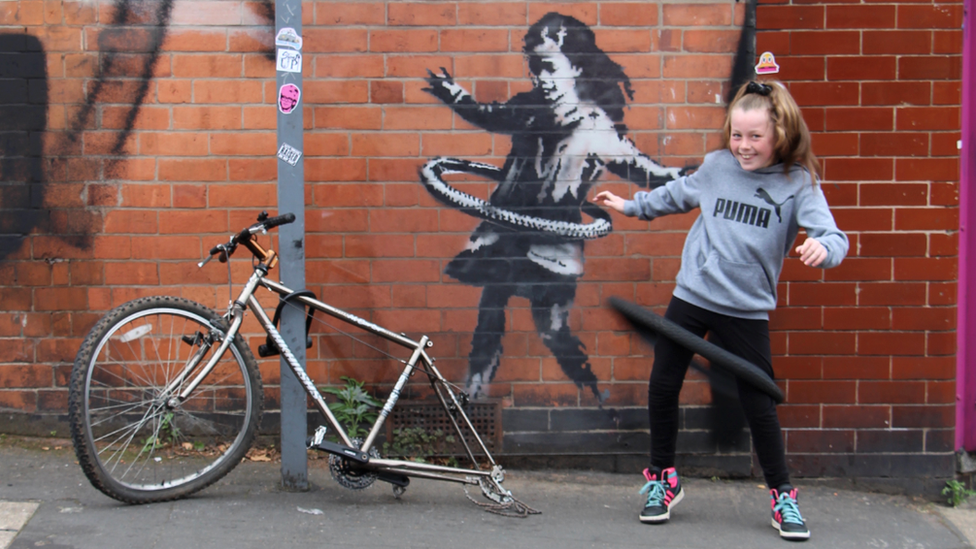
When the Banksy appeared in October, people flocked to have their photo taken with it
Mr Brandler, who owns a number of Banksy's works, has admitted being taken aback by the reaction from Nottingham.
The art dealer said he had received "vitriolic emails" from about 20 to 30 people and has "never had mail like it".
He told the BBC he acted in order to protect the mural, which he said would eventually have been destroyed by mould behind the plastic screen installed by Nottingham City Council.
"I am preserving it," he said. "I am restoring it at vast expense - how many people complaining would put their hand in their pocket?"
"Nottingham had the chance to buy it."
But he also admitted "it's not site specific to me, I don't know Nottingham" - and what has upset many in the city is that Banksy seems to have chosen the location carefully.
'I miss it already'
The bicycle imagery in the mural (along with the now-removed bike chained to a street sign) has been widely interpreted as a nod to Nottingham's industrial heritage.
Rose Kirlew, who was raised in the area, said: "My dad was a foreman at the nearby Raleigh factory. To see that artwork here, I felt so good for him."
"You should have seen the crowds in the first week it was here. It was amazing.
"And it was still attracting a lot of attention [before it was taken].
"I'm not saying it might not have been moved eventually, but it's gone too quickly."
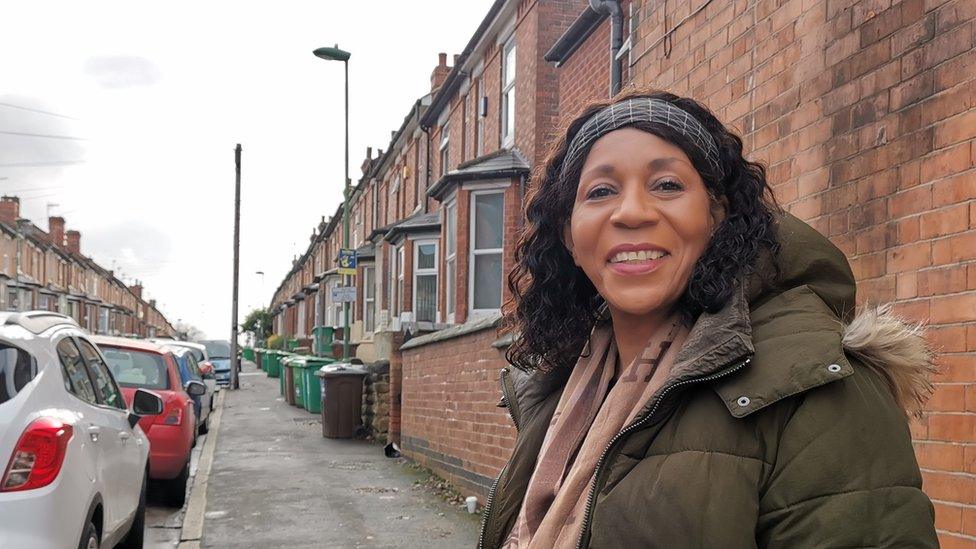
Rose Kirlew believes more could have been done to keep the mural in the city
Ms Kirlew said she had seen people staring "in shock" at the chipboard which has replaced the artwork.
"I think if people had known it would be taken away, we would have done something.
"I would have called for more support. A lot of people are really upset it's gone, and I'm one of them.
"I miss it already."
Nigel King, 55, from West Bridgford, tweeted: "They've taken our Banksy!"
He told the BBC: "This was a rare piece of good news for the city in recent months and its been spirited away from us in the middle of night.
"It's a reversal of Robin Hood - its been robbed from the people and given to the rich."
Lilian Greenwood, the area's MP, has also expressed her disappointment, saying she was "gutted" to hear the Banksy had been removed.
She said: "If the owners had asked for my help I would certainly have done all I could to keep it here in Nottingham."
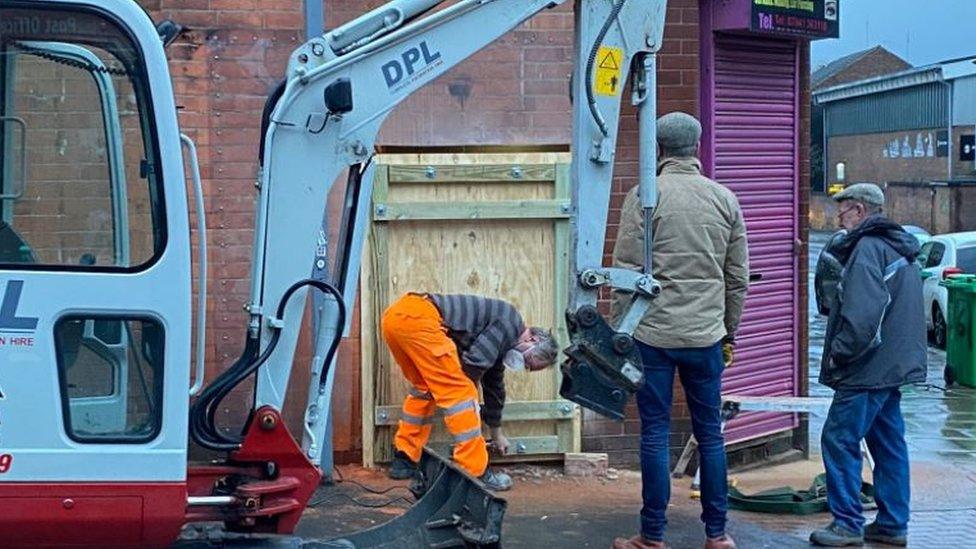
Specialist workers were employed to remove the Banksy
A spokesman for the building's owner, who wishes to remain anonymous, told the BBC they had tried "hard" to donate the artwork.
But he said the estimated cost of removing it from the wall proved too high for local organisations.
He also said that Banksy's team "advised" the mural be left in place, and the process was "more complicated than I ever could have imagined".
"I understand why people are so upset," he added. "When I first saw the news I was excited to have a Banksy in Nottingham too, and I'm gutted it's gone."
He said the proceeds of the sale would be donated to local groups.
'Ephemeral nature'
The city council said it tried to secure the work but "those options were exhausted" and so it was left to the property owner to decide what to do next.
The authority said it had been unaware of the plans to move the mural and "regretted" that it had been lost to the city.
Some, however, have argued that the artwork was always going to be temporary.
Kyle MacLean, a 23-year-old student at the University of Nottingham, said while he was not happy to see it gone, the "ephemeral nature" of a Banksy is what makes it exciting.
He added: "It is a risk with his works. They could be lost.
"They're not going to be there forever."
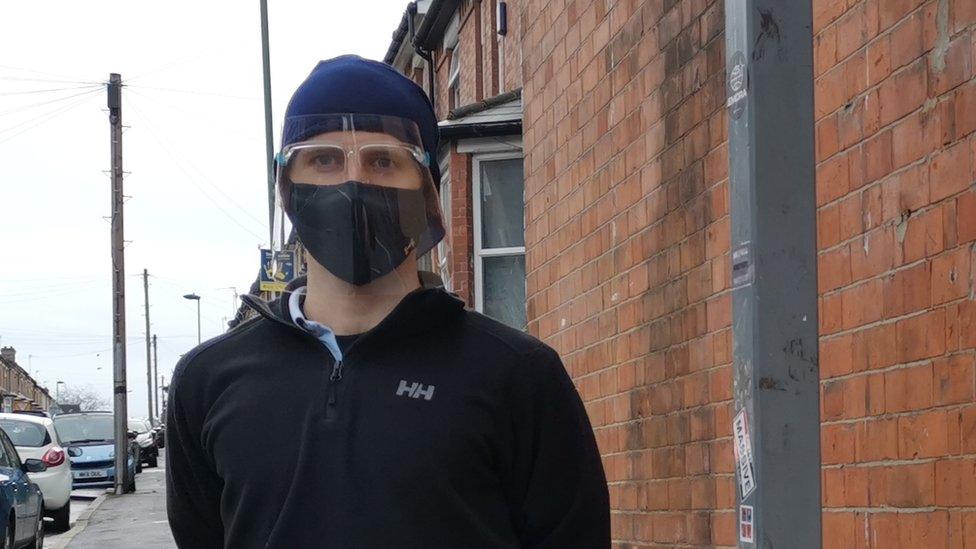
Kyle MacLean said the nature of Banksy artworks meant they were often at risk of being lost
And the BBC's arts editor Will Gompertz agreed, saying "it's part of what happens to his work - others have been whitewashed and had graffiti put all over them so they're no longer visible".
But he also pointed out that in moving the Banksy, something has been taken away - not just from the city - but from the artwork itself.
He said: "The work is substantially diminished by removing it because the work was so site specific, because it was responding to the bike on the lamp-post, because it was responding to the history of Nottingham, it worked so well in that spot.
"When you remove it, it is diminished, it doesn't say the same things, and I think it is worth less. Not worthless, but worth less."

Follow BBC East Midlands on Facebook, external, on Twitter, external, or on Instagram, external. Send your story ideas to eastmidsnews@bbc.co.uk, external.
Related topics
- Published19 February 2021
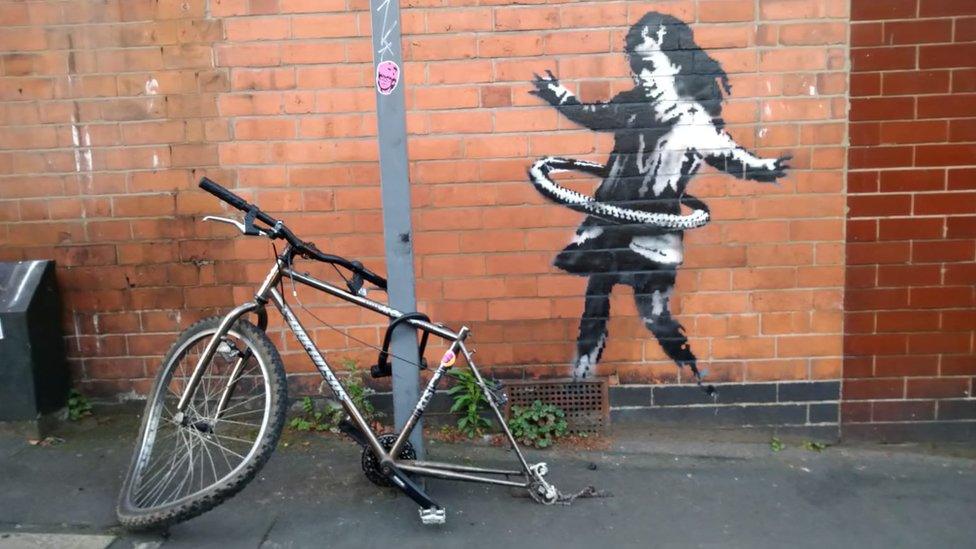
- Published17 February 2021
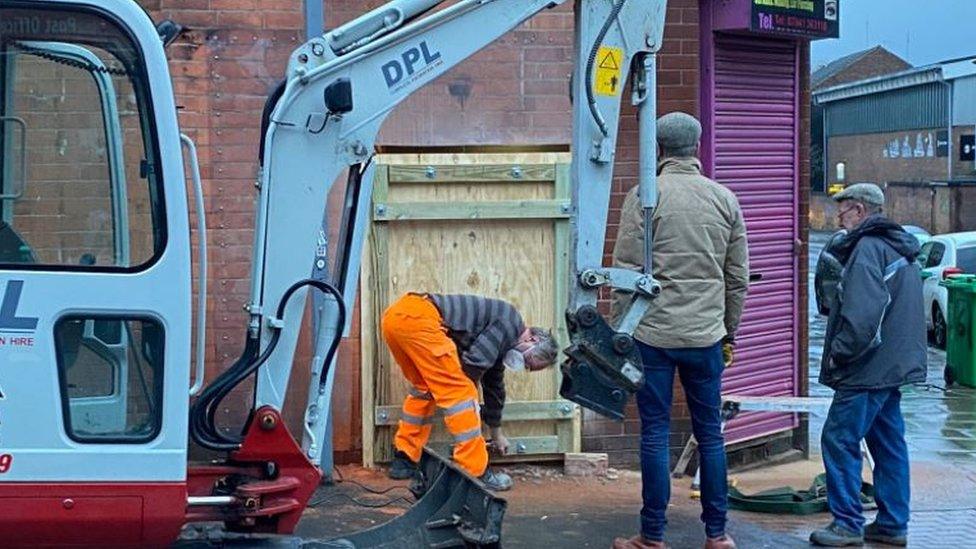
- Published18 October 2020
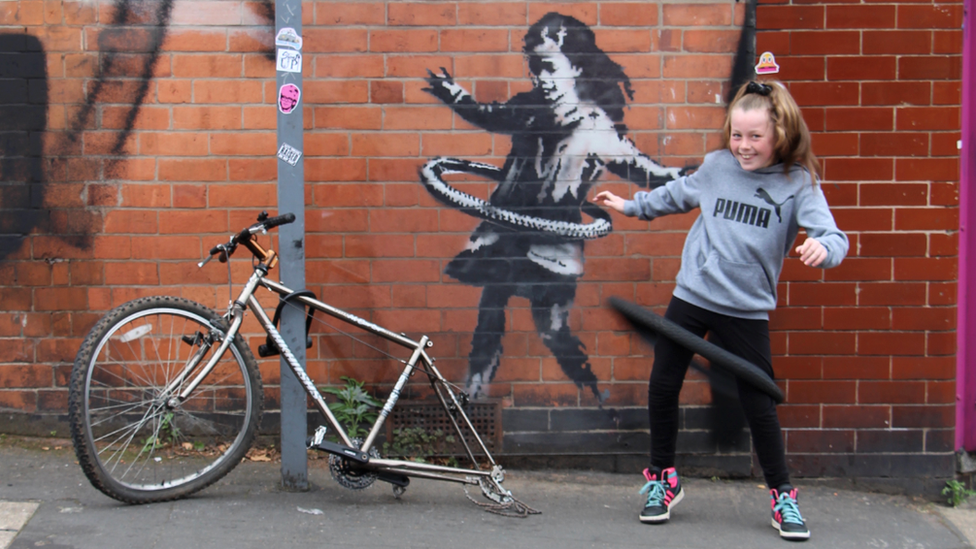
- Published17 October 2020
